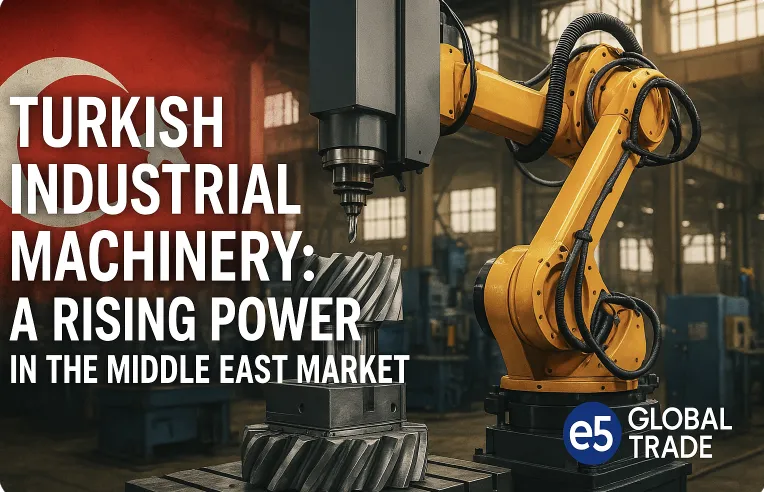Turkish Industrial Machinery: Rising Power in the Middle Eastern MarketIn recent years, Turkey's industrial machinery sector has experienced a remarkable rise in the Middle Eastern market. Offering both quality and price advantages, Turkish machinery has become a favorite among manufacturers and factories in the region. In this article, we briefly explain why Turkey is a preferred choice in the Middle East, which sectors it is in demand in, and future trends. Why Turkey? Middle Eastern countries are importing machinery and equipment to increase their production capacity and strengthen local industry. In this regard, Turkey stands out with its geographical proximity, cultural similarities, and competitive prices. Geographic Advantage: Turkey is very close to the Middle East. Shipping times and costs are much lower than purchasing from Europe or Asia. Quality-Price Balance: Not as expensive as German or Japanese machinery, nor as poor quality as Chinese machinery. Turkish machinery is recognized as the “best in the mid-range segment.” Local Support and Service: Turkish-speaking technical teams, Arabic-speaking sales consultants, and region-specific spare parts support provide significant convenience for customers. Flexible Production and Customization: Turkish manufacturers can produce machines according to customer specifications. This meets the specific needs of the Middle East. Which Sectors Are in Demand? In the Middle East, demand for Turkish machinery is growing, particularly in the following sectors: Food and Beverage Machinery Water bottling, dairy, bakery, and meat processing machines are among the top-selling products. Water filling and purification systems are also very popular in regions where water resources are limited. Textile and Clothing Machinery Textile factories are growing rapidly, especially in Jordan, Egypt, and Saudi Arabia. Turkish sewing, cutting, and printing machines are preferred in these factories. Construction and Concrete Machinery Massive projects are underway in countries such as Qatar, the UAE, and Saudi Arabia. Concrete plants, mold systems, and cranes are purchased from Turkish manufacturers. Packaging Machinery: The packaging sector is booming with increasing consumer demand and export-oriented production. Automatic packaging, labeling, and wrapping machines are attracting significant interest. Agricultural and Livestock Machinery: Irrigation systems, tractors, feed production lines, and milking machines have become indispensable for Middle Eastern farmers. Competitors and Our Difference: China, India, and European countries are also present in this market. But Turkey's difference lies in this: higher quality than China and more affordable prices than Europe. Faster delivery and better technical support than India. Religious and cultural closeness facilitates trust and long-term collaborations. Turkish engineers' rapid response ability in the field increases customer satisfaction. Digital Transformation and New Trends: Factories in the Middle East are now transitioning to "smart production." Turkey is also progressing rapidly in this area: IoT-integrated machines (controllable over the internet), remote maintenance and fault diagnosis, energy-efficient and sustainable machine designs, mobile app support and training with AR (Augmented Reality). These technologies are making Turkish machinery even more popular in the region. Easy Ways to Trade: Selling machinery to the Middle East is now very easy: Promotions are carried out through Chambers of Commerce and Industrial Clusters. International fairs (e.g., Dubai Big 5, Gulfood, Arab Health) are opening doors to Turkish companies. E-commerce platforms (e.g., Turkish Machinery, ExportHub, Made-in-Turkey) allow customers to contact manufacturers directly. Financing Options: Payment plans supported by Turkish Eximbank and KOSGEB provide convenience for customers. What Does the Future Hold? Industrial investments in the Middle East will increase between 2025 and 2030. In particular: Saudi Arabia's Vision 2030 plan, the UAE's industrial diversification goals, Egypt's new capital project, and the reconstruction efforts in Iraq and Syria present significant opportunities for the Turkish machinery sector. A Final Word: Trust + Quality + Proximity = Turkey. Middle Eastern manufacturers now know this: "If you want quality machinery, don't go expensive. Don't go far. Look to Turkey." The meticulousness of Turkish engineers, the flexibility of Turkish industrialists, and the reliability of Turkish trade will continue to make our name known in this region.
E5 Global Trade | Yazılar
Turkish Industrial Machinery: A Rising Force in the Middle East Market


